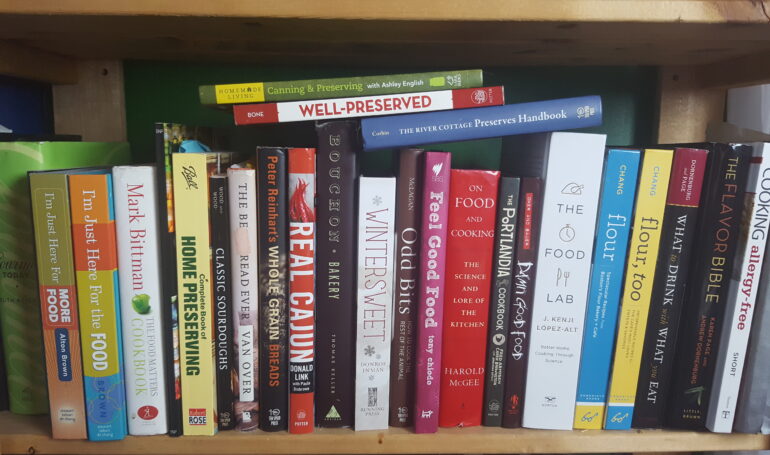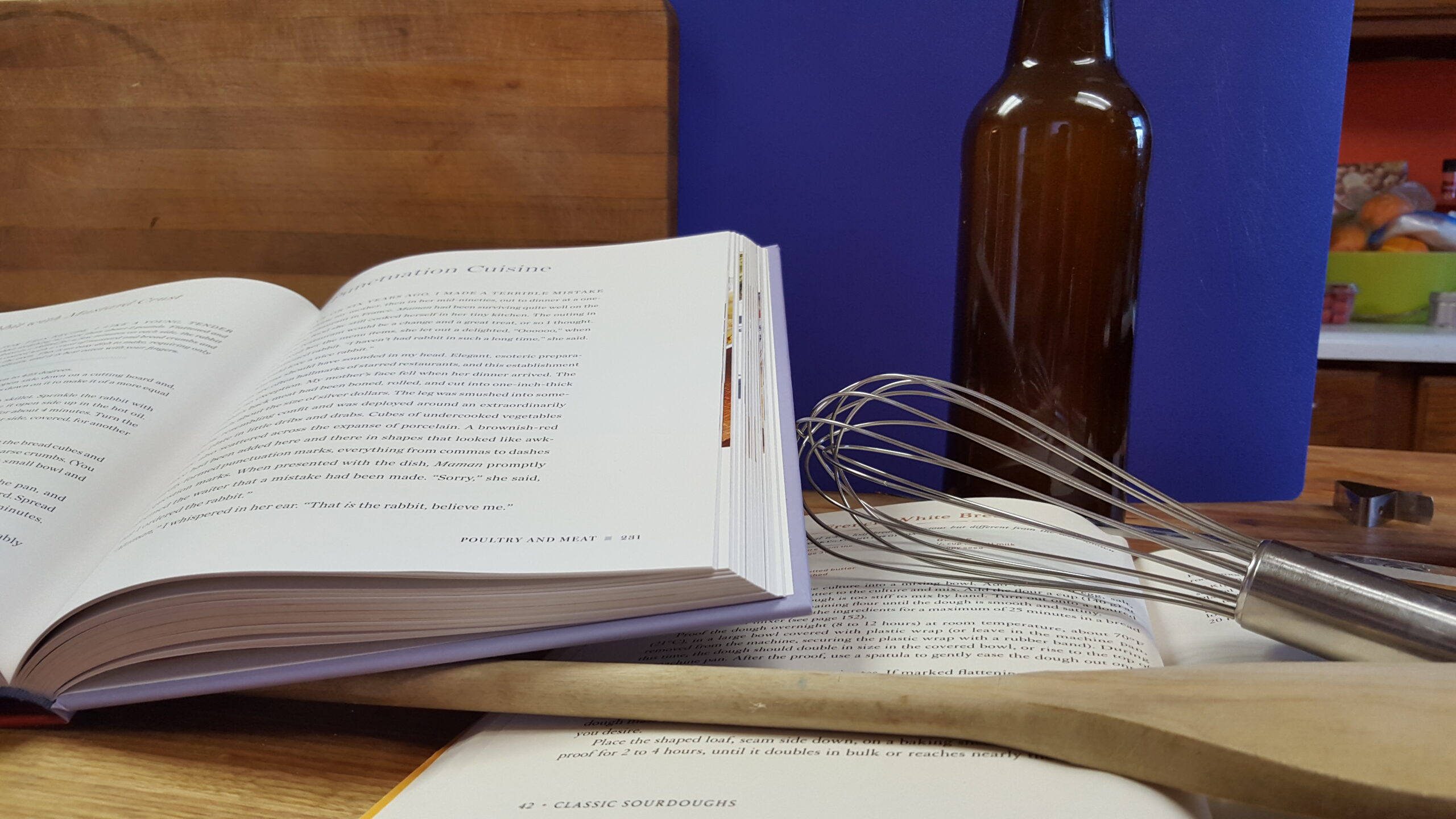
So, You Started a Cookbook Club
Sometime ago I read an article on Serious Eats titled “Why Cookbook Clubs Should Be the New Way We Entertain,” and it sounded awesome. To summarize, a Cookbook Club it isn’t much more than hosting a potluck with enthusiastic strangers who love cooking, cookbooks and eating where each person brings a dish from a selected cookbook or cookbook theme.
Despite cries from the publishing industry about dropping sales and proclamations about the death of the printed book. And, despite Elizabeth G. Dunn lamenting that cooking from cookbooks isn’t actually easy in her Atlantic article “The Myth of Easy Cooking“, sales of physical cookbooks are soaring (at least according to this article). So, I figured creating a Cookbook Club was a no-brainer way to gather with other cookbook lovers for regular cooking and eating adventures.
I started The Boston Area Cookbook Club just a few months ago on Meetup. Following the announcement of the group, there was a pretty fast growth spurt. However, it seems, like actually cooking from the cookbooks we buy, many people are interested, but most of them find it hard to commit. I found creating a vibrant, active, engaged community of cookbook enthusiasts is not as simple as ‘If you build it, they will come.’ There is work and commitment on behalf of the organizer to get things going. And then, there is more effort on behalf of the organizer to keep them going. But if you are lucky and willing to ask, you will find a few eager souls to help you out and keep up the energy.
So, I thought I would share a few things I’ve learned in the club’s short existence to help you start your own. I figure this will be a series of posts about Cookbook Clubbing, so for this post, I want to talk about how to getting people to club meetings and finding people and locations for hosting meetings.
Managing RSVPs
This is probably where an organizer puts in the most effort. You have to take on a tough love stance about RSVPs. First, I acknowledge poor RSVP etiquette on Meetup is rampant. I too use the ‘YES’ response to ‘hold a place’ for an event so I could receive reminders. I am not going to dive into the technical ins and outs of that. Just know, if you are hosting free events, there are usually a lot of no shows.
Here are some tips for trying to minimize them.
- Send members an ‘RSVP Etiquette & Rules’ email. I included a ‘no-show policy’ that blocks a member after 2 no-shows.
- Limit the space available. Scarcity makes people less likely to place hold and more likely to commit.
- Do not allow people to RSVP with a guest (aka turn off the +1 feature). Some people RSVP for two so they won’t be alone . Then, if they can’t find a +1, it leaves two no-shows. If someone wants to bring a friend, make the friend join and RSVP.
- Require people who RSVP to post a recipe before the meetup.
- A week before the meeting, send a reminder message to “YES” RSVPs. Remind them to post a recipe if they haven’t doneso. Letting them know there is a waitlist often guilts some into updating, but also gently remind them if they don’t post a recipe by a time and date, you will change their RSVP to ‘NO’ to allow waitlisted people in.
- A few hours prior to the deadline, DM anyone who hasn’t posted a recipe and remind them they will be changed to ‘NO’ in a few hours and it will count as a no-show.
- Close RSVPs at least 24 hours prior to the meeting so your host can plan.
Hosting and Finding Hosts
It is difficult to find people to host. They don’t want strangers in their house and they don’t want to deal with no-shows. Managing the RSVPs is the first step in recruiting hosts. When we started, I hosted meetings until my kitchen remodeling overtook the house and prevented me from entertaining. I didn’t want to host more than once a month, so with a maximum of 20 guests and nearly 200 members, it makes it tough to engage people and get momentum. So, recruiting hosts is essential.
- For the first few months, I held an after work ‘Meet and Mingle’ at a pub. This helps a subset of members get to know each other. And, it also helps identify potential hosts and people eager to get more involved.
- Send members a call to action looking for leaders, hosts and donations to cover supplies and fees (Meetup ain’t free no more). I found people ready to host, lead and pay. All I had to do was ask!
- If just 1 or 2 people are willing to host once or twice a month, you suddenly have a very active calendar.
- If people volunteer to host or lead, meet with them to talk about ideas, food and cookbooks.
- Let go of your ‘ego’. I had a vision of how I wanted the meetings to be set up and organized, but other leaders are doing things their way. Unless you want to commit to being an unpaid event planner who controls everything, make your peace with it for the greater good.
- Keep searching for neutral ground places to host. Most restaurants can’t allow outside food. Ask people living in apartment buildings if they have a common space they can reserve. In the summer, think about parks or other destinations. Some city libraries have cookbook clubs and host in the library.
Paid Events, Fees & Cookbook Selections
Charging a modest fee ($5) helps cut down on people RSVPing as a placeholder. In my opinion, MeetUp is not a great tool for collecting fees because they haven’t had a ticketing system in the past. I’ve seen people use Eventbrite for tickets, but this still allows people to placehold an RSVP on without purchase. I think Meetup recently added a ticketing system, but I have not tested it. However, I am considering a few paid events where people pay to cover a ferry ticket or location entry fee or rental fee, but I don’t plan to do that for profits.
Personally, I really want The Boston Area Cookbook Club to be an open and inviting group. Since many cookbooks are already expensive, that is already barrier to entry. Some of the hosts call to libraries to see if they have the book available or they select cookbooks with recipes available online. I like to support local authors and ask people to buy books directly from them. I have not charged for any meetings, but suggest hosts ask for $5 from everyone to cover their costs.
Overall, The Boston Area Cookbook Club has been a wonderful way to meet other people who love to cook as well as learn some new recipes. I finally am taking some of my many cookbooks that only looked pretty on the shelf for a ride and the results are pretty stunning.
Stay tuned for more cookbook club insights.

Leave a Reply